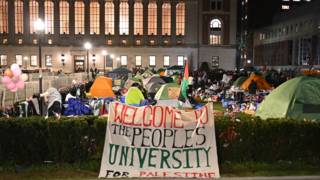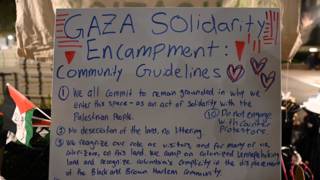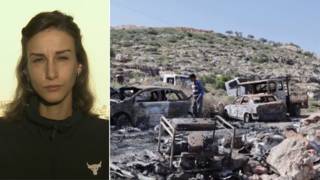
Related
By Amy Goodman with Denis Moynihan
Denmark is the home of renowned children’s author Hans Christian Andersen. Copenhagen is dotted with historical spots where Andersen lived and wrote. “The Little Mermaid” was one of his most famous tales, published in 1837, along with “The Emperor’s New Clothes.”
As the United Nations’ climate summit, called “COP 15,” enters its final week, with more than 100 world leaders arriving amid growing protests, the notion that a binding agreement will come from this conference looks more and more like a fairy tale.
The reality is harsher. Negotiations have repeatedly broken down, with divisions between the global North, or industrialized countries, and the global South. Leading the North is the United States, the world’s greatest polluter, historically, and a leader in per capita carbon emissions. Among the Southern nations are several groupings, including the least-developed countries, or LDCs; African nations; and nations from AOSIS, the Alliance of Small Island States. These are places where millions live on the edge, directly impacted by climate change, dealing with the effects, from cyclones and droughts to erosion and floods. Tuvalu, near Fiji, and other island nations, for example, are concerned that rising sea levels will wipe their countries off the map.
New conceptions of the crisis are emerging at COP 15. People are speaking of climate justice, climate debt and climate refugees. Indian scientist and activist Vandana Shiva was among those who addressed a climate justice rally of 100,000 Saturday in Copenhagen. Afterward, I asked her to respond to U.S. climate negotiator Jonathan Pershing, who said the Obama administration is willing to pay its fair share, but added that donors “don’t have unlimited largesse to disburse.” Shiva responded, “I think it’s time for the U.S. to stop seeing itself as a donor and recognize itself as a polluter, a polluter who must pay. … This is not about charity. This is about justice.”
Shiva went on: “A climate refugee is someone who has been uprooted from their home, from their livelihoods, because of climate instability. It could be people who’ve had to leave their agriculture because of extended drought. It could be communities in the Himalayas who are having to leave their villages, either because flash floods are washing out their villages or because streams are disappearing.”
Both inside and outside the summit there is a diverse cross section of nongovernmental organizations, or NGOs, from indigenous-peoples delegations to environmental and youth groups. Their separate but connected efforts have been coalescing into a new movement, a movement for climate justice. Broad consensus exists among the NGOs and the global South that any agreement coming out of the U.N. process must be fair, ambitious and binding, or as they put it, “FAB.”
The Bella Center itself, where the summit is being held, is said by the U.N. to be at capacity. Thousands of people line up daily in the cold, vainly hoping to get in to the Bella of the Beast. Thousands more, from the NGOs, are having their access stripped, ostensibly to make room for visiting heads of state, their entourages and security.
Outside, Copenhagen is seeing an unprecedented police crackdown, with the largest and most expensive security operation in Denmark’s history. More than 1,200 people were detained over the weekend, and as this column goes to press, targeted arrests of protest organizers and police raids of public protest convergence spaces are being reported. Heavy-handed police tactics give another meaning to “COP 15.”
After South African Archbishop Desmond Tutu spoke at a candlelight vigil for children, I asked whether he thought President Barack Obama was following through on climate change. He responded: “We hope he will, yes. He has given the world a great deal of hope. I have said he’s now a Nobel laureate—become what you are.”
Last week, as a polar bear ice statue melted downtown, revealing the dinosaur skeleton hidden within, a small ice replica of Copenhagen’s famous Little Mermaid statue sat outside the Bella Center, melting. She is now gone. Obama is making his second attempt to win a prize in Copenhagen, after the Chicago Olympics embarrassment. Unless he uses the U.S. Environmental Protection Agency’s new determination that carbon dioxide is a public health hazard and nails down a fair, ambitious and binding agreement, we may see Andersen’s “The Emperor’s New Clothes” played out on the global stage.
Amy Goodman is the host of “Democracy Now!,” an independent, daily global TV/radio news hour airing on more than 950 stations in the United States and around the world. She is the author of “Breaking the Sound Barrier,” recently released in paperback and now a New York Times best-seller.
© 2011 Amy Goodman











Media Options